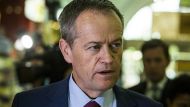Talk of a potential constitutional and/or political crisis following this federal election result is at best premature and most likely totally without foundation. That, however, is not to deny that there are important consequences and lessons from the election outcome.
More News Videos
Turnbull: 'I take full responsibility'
Speaking to the media on Tuesday afternoon, Malcolm Turnbull acknowledged the disappointing election outcome for the Liberal National Coalition. Vision courtesy ABC News 24.
Crisis talk is unwise because the election has not delivered anything that the system cannot handle, barring an absolutely rock-solid 75-all deadlock in the House of Representatives which is highly unlikely. The crossbench is mostly comprised of sensible people who will recognise the situation and react accordingly, even if it does take some time. That applies to the major party leaders, too. A delay in forming a government is almost certain because of the slow count of the votes but the likely outcomes will emerge fairly quickly.
One-seat majorities after providing a speaker, such as with Robert Menzies in 1961 or more recently with Julia Gillard in 2010, have proved quite workable even though in the Gillard government case the media encouraged a situation of constant high alert. The media love a crisis but there is no point inventing one.

Our reaction in these circumstances is largely dictated by the dominant two-party, majoritarian mindset which is at odds with reality. In some ways it is a replay of the reaction to the 2010 House of Representatives result combined with the reaction to the 2013 Senate result. So we have a double bunger on our hands but the component parts are each not so unusual.
Minority government is not unusual either internationally or at the state level. In such situations, it is usually just as stable and productive as majority government. The legislative record of the Gillard government shows that. Furthermore, Australia regularly has minority government disguised as Coalition government in which the senior partner, the Liberals, combines with a junior partner, the Nationals.
Seeing it this way is not far-fetched. Consider the regular rules that surround the formation of Coalition arrangements between these two parties, including dividing the spoils of victory, and the special deals that are done. This was the case in September last year when Malcolm Turnbull replaced Tony Abbott. The Nationals played hardball and inflicted compromises over policy on Turnbull in a way not much different from what happened with the Labor-Green alliance in 2010.
The talk by the major parties of chaos and dysfunction accompanying minority government is misleading. Turnbull was especially guilty of this during this campaign but Shorten joined in by denouncing the Greens. Effectively the major parties, which naturally prefer majority government, have for years run campaigns of misinformation. So when minority government happens they reap in popular concern what they have sown during campaigns.
The same is true with the second component, which is multi-party representation in the Senate, denying either major party control of the upper house. This has been the case for almost 40 years now yet prime ministers on both sides cannot help themselves when they choose to inflame the situation. They all do it yet it is a natural consequence of a bicameral system mixed with a diverse society. Paul Keating condemned the Senate as "unrepresentative swill" and Abbott described it as "feral". The upper house is nothing of the kind, and plays an important if evolving democratic role.
This was true even of the most recent Senate, which attracted Abbott's ire, with its eight crossbenchers. Certainly the crossbench was remarkably diverse and at times mixed populism, inexperience and obduracy, but on most of the matters on which they resisted government legislation, including the 2014 budget, they reflected wider community concerns.
Yet Turnbull introduced Senate voting reform and then followed that with a double dissolution election primarily to get rid of this crossbench made up of micro-party and independent senators. This was his first mistake and as a consequence, if he does retain government, he will be faced by a new crossbench that will probably be just as large and certainly will contain a more extreme ingredient in the form of Pauline Hanson and other One Nation Party senators.
He also may be faced with negotiations with the House of Representatives crossbench which he has done his best to belittle and brand as chaotic during the campaign.
Turnbull has been diminished by the result whatever the details eventually turn out to be. This applies even if he is able to form a minority government. Yet he will need all his strength and authority to be able to make his way, perhaps even survive, within his own party and within the Coalition with the Nationals.
Turnbull did much better than Abbott would have at this election. The best comparison is with Kevin Rudd when he took over from Gillard in 2013 and was able to save some Labor seats. Turnbull may have saved the government. Yet conservative Liberals will never give him any credit for this. Expectations, fuelled by Turnbull's initial popularity, were just too high.
The Nationals, buoyed by a much better election performance than their Liberal allies, will expect further favours, including another ministry. Led by Barnaby Joyce they will be brimming with confidence. The Coalition will be tilted in a more conservative direction and Turnbull will be in a much weakened position if he tries to resist.
If there is political instability it will be caused by leadership tensions within the major political parties rather than anything inherent in either minority government or lack of government control of the Senate. There is actually much to celebrate, and little to fear in the further injection of diversity into both houses of Parliament.
John Warhurst is an emeritus professor of political science at the Australian National University.










0 comments
New User? Sign up